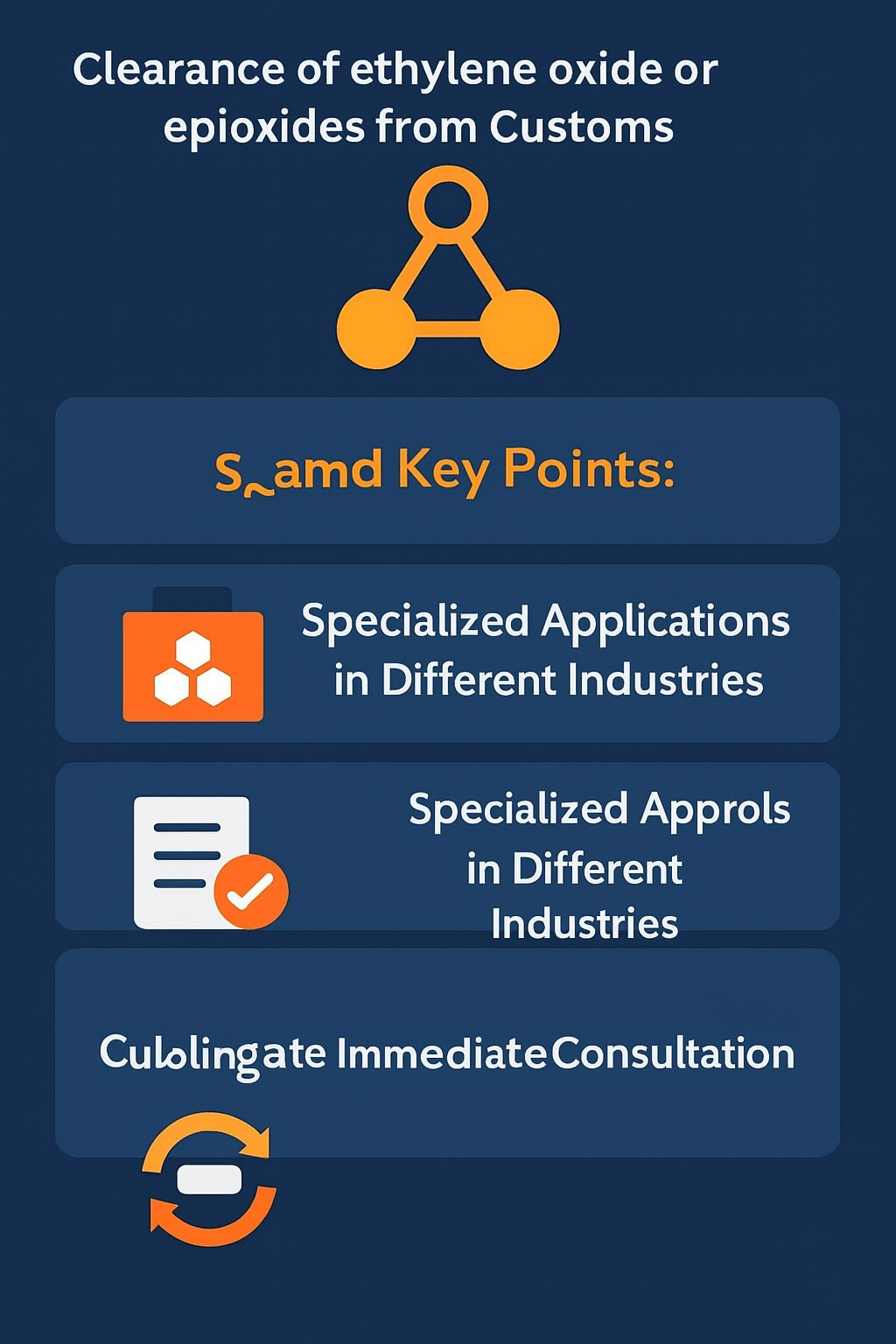Customs Clearance of Epoxide (Epylene Oxide)
To estimate the time and cost of epoxide/epylene oxide clearance, contact the experts at Saba Tarkhis.
Instant Free Consultation
Specialized Industrial Applications of Epoxide
Technical & Key Points in Epoxide Customs Clearance
Tariff Classification (HS Code) & Duties: Epoxide is classified under HS Code 29093090. This code falls under organic chemicals and determines the payable customs duties and charges related to this substance. Using the precise HS Code in the customs declaration is mandatory to avoid any problems or delays in clearance.
Specific Conditions for Epoxide Import & Export
Epoxide Imports to Iran
Epoxide Exports from Iran
Epoxide Import & Export Volumes in Iran
Global Circulation of Epoxide
Major Global Exporters of Epoxide
South Korea: With advanced chemical infrastructure, South Korea is a main exporter, shipping to many Asian and European countries.
United States: Also a major producer, exporting to industrialized and developing countries; its advanced petrochemical sector plays a key role in producing/exporting chemicals including epoxide.
Germany: With advanced chemical industries and high production standards, Germany is among the largest exporters of high-quality epoxide worldwide.
Main Global Importers of Epoxide
Turkey: A principal importer with large, developing petrochemical sectors.
Iran: Despite domestic production, part of its epoxide demand is still met via imports, especially from industrial countries such as China and South Korea.
Brazil: A major importer in South America due to rapid growth in petrochemicals and plastics production.
Documents Required for Epoxide Customs Clearance
- Commercial Invoice: Must include full purchase details such as price, quantity, and exact product specifications; duly confirmed by the seller and officially issued.
- Proforma Invoice: Contains preliminary transaction details (payment terms, transport, technical specs) issued before finalizing the purchase.
- Certificate of Origin (CO): Indicates the producing country and is endorsed by the exporter’s chamber of commerce; required for tariff determination and application of import duties.
- Order Registration Permit: Mandatory from Iran’s Trade Promotion Organization confirming the goods comply with import regulations.
- Bill of Lading (B/L): Issued by the carrier, showing transport details (route, weight, handling conditions).
- Inspection Certificate: In some cases required from accredited firms to verify the product matches contractual specifications.
- Permits from Relevant Authorities: Department of Environment permit is necessary due to epoxide’s chemical nature and environmental risks.
- Ministry of Health Permit: For certain chemicals, MOH approval is required to ensure human safety. National Standards Organization Permit: Depending on the product, some chemicals must comply with national standards and obtain approval.
- Certificate of Analysis (COA): Issued by the manufacturer or an accredited lab, detailing quality and exact chemical composition; must match contractual technical specs.
- Customs Declaration: Completed by the importer or customs broker, including precise details (quantity, value, HS Code); accuracy is critical to avoid delays.
- Cargo Insurance Policy: Covers potential risks during transport, ensuring compensation in case of incidents.
- Commercial Card (Business License): Required for any international trade activity such as importing epoxide; issued by the Chamber of Commerce.
Sample HS Classification
| Goods | Short Description | HS Code |
|---|---|---|
| Epoxide (Epylene Oxide) | Raw material for epoxy resin / resistant coatings | 29093090 |
The final subheading depends on type, purity, additives, and form of supply.
Need precise HS determination, permits, and COA/MSDS prep? Our team manages the process end to end.
Submit Proforma RequestFrequently Asked Questions
What is the HS Code for epoxide/epylene oxide?
As stated, epoxide is classified under 29093090; the final subheading depends on grade, purity, and form of supply.
Which documents are required for epoxide clearance?
Invoice/Proforma, Certificate of Origin, order registration, Bill of Lading, inspection certificate, COA, MSDS, insurance, customs declaration, and permits from environment/health/standards authorities.
What are the standards for epoxide packaging and transport?
Corrosion/leak-resistant packaging; compliance with IMDG for sea and IATA for air; storage with ventilation and temperature control.
Special Customs Clearance Services by Saba Brokerage
As a reputable customs brokerage, Saba offers specialized services for importing epoxide (epylene oxide). With a focus on HS consulting, order registration, obtaining environmental/health/standards permits, preparing COA and MSDS, and document management, we comprehensively manage the process so this sensitive and flammable material is cleared in compliance and in the shortest possible time.
Specialized Epoxide Clearance Services:
- Strategic & Technical Consulting: Accurate determination of HS Code 29093090 based on grade/purity/form, duty/tariff review, and optimal clearance routing.
- Order Registration & Permits: Order registration in the system; obtaining permits from the Department of Environment, Ministry of Health, and, if needed, the National Standards Organization in line with hazardous chemicals requirements.
- Specialized Document Management: Preparing/checking COA, MSDS, inspection certificate, certificate of origin, B/L, insurance, and customs declaration, fully matching shipment technical specs.
- Expedited Clearance: Real-time case follow-up, reduced warehousing time, and prevention of demurrage via effective coordination with customs units and relevant organizations.
- Safe Packaging & Transport: Guidance for leak/corrosion-resistant packaging and coordinating transport per IMDG (sea), IATA (air), and ADR (road), including labeling requirements.
- Sampling & QC Oversight: Coordinating inbound tests to verify chemical composition against standards and obtained permits.
.png)
